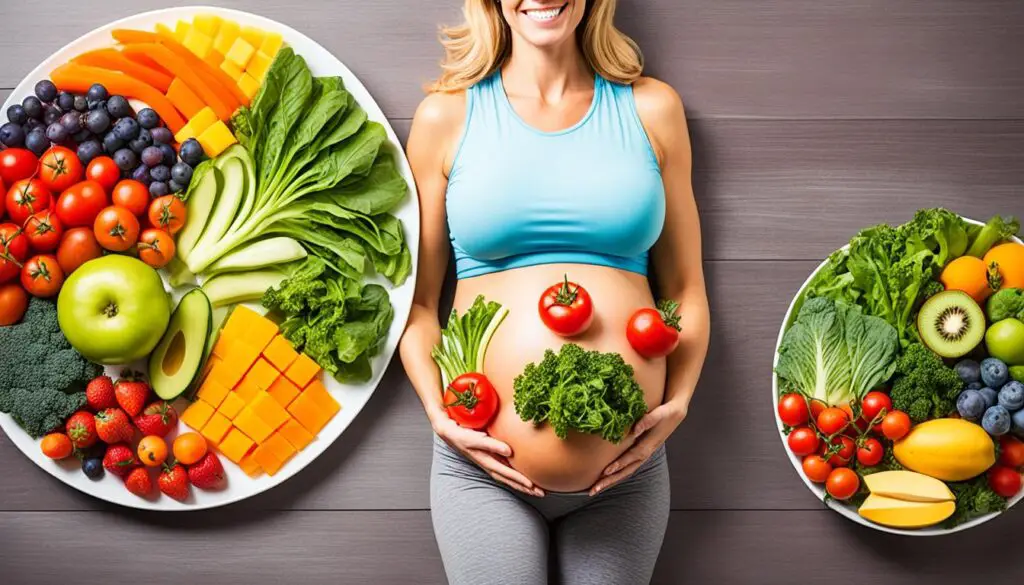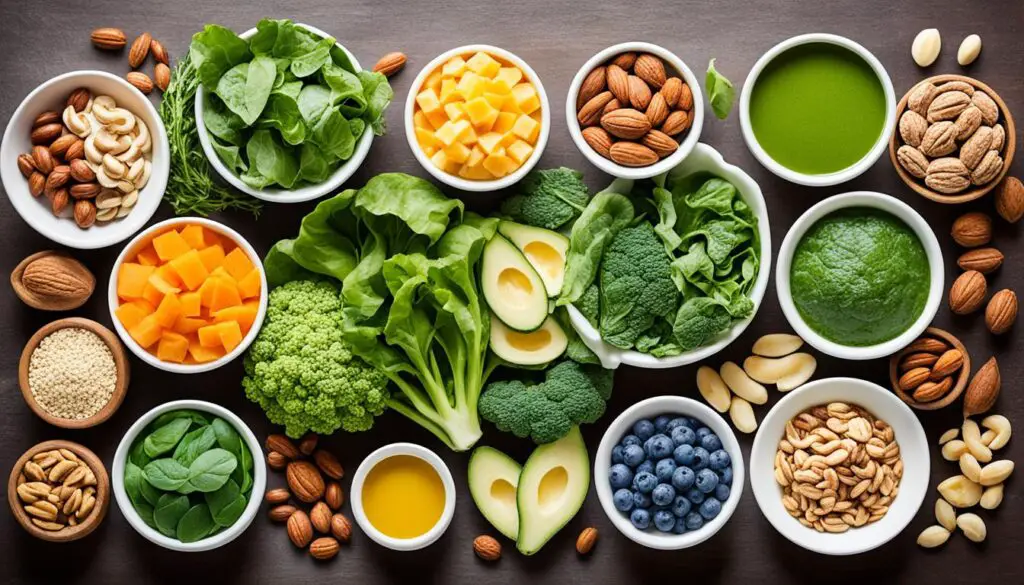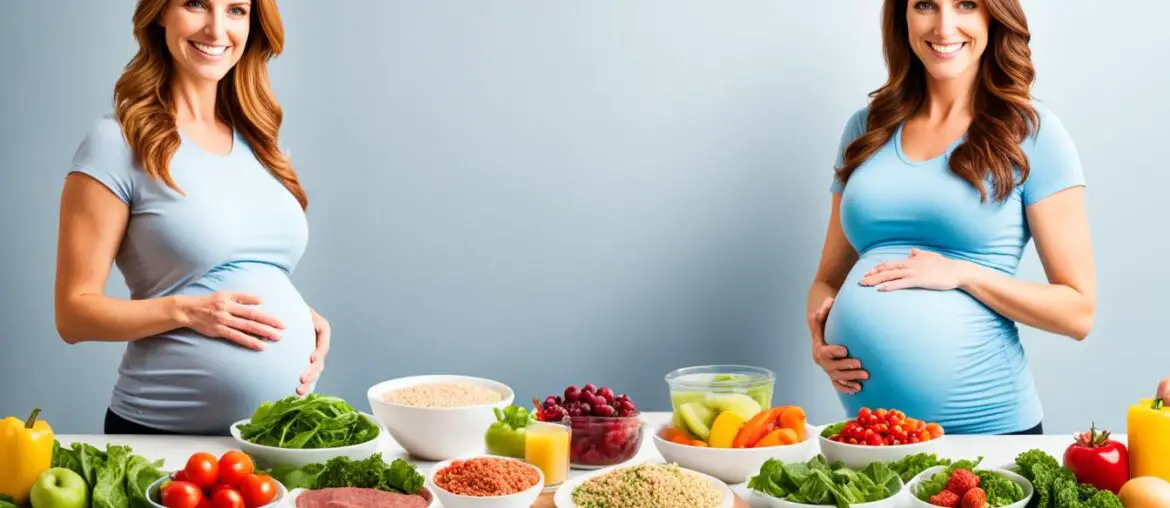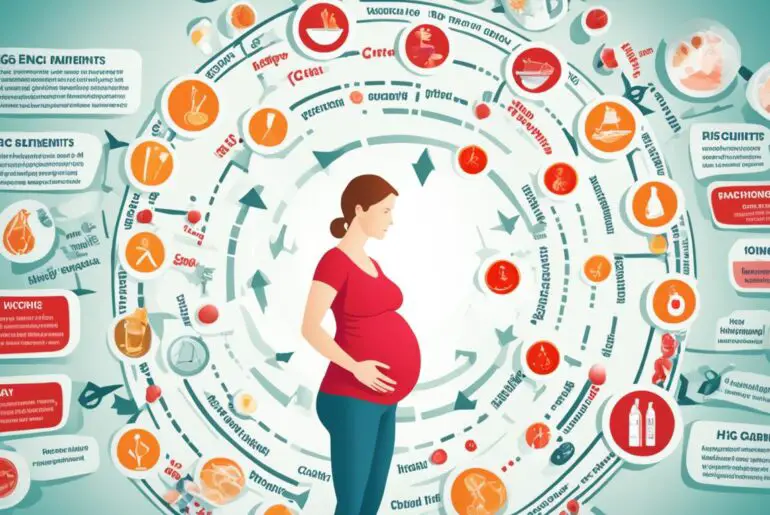Did you know that the HCG diet, a controversial weight loss regimen, involves consuming only 500 calories per day? It may seem incredulous, but some individuals are willing to try extreme measures in their quest for rapid weight loss. However, when it comes to pregnancy, nutritional requirements are vastly different, focusing on the well-being of both the mother and the growing fetus. Let’s explore the differences between the HCG diet and pregnancy dietary needs, ensuring a safe and healthy journey for both mom and baby.
Key Takeaways:
- The HCG diet involves consuming only 500 calories per day and using the HCG hormone for weight loss.
- Pregnancy dietary needs prioritize proper nutrition for the mother and the developing fetus.
- The HCG diet is not recommended during pregnancy and can pose risks to both mom and baby.
- Maintaining a healthy diet and weight is essential for a successful pregnancy.
- Consulting with a healthcare provider is crucial for personalized guidance during pregnancy.
What is the HCG Diet?
https://www.youtube.com/watch?v=mJzl6NheRYk
The HCG diet is a controversial weight loss regimen that involves consuming only 500 calories per day and using the human chorionic gonadotropin (HCG) hormone. This diet claims to target stored body fat instead of muscle mass, leading to rapid weight loss.
However, it is important to note that the safety and effectiveness of the HCG diet are not supported by scientific evidence. Additionally, the FDA has not approved HCG for weight loss purposes.
The HCG diet’s extreme calorie restriction can lead to nutrient deficiencies and pose health risks. It is crucial to approach weight loss and diet regimens with caution and prioritize overall well-being.
“The safety and effectiveness of the HCG diet are not supported by scientific evidence.”
While the promise of quick weight loss may be appealing, it is important to consider the potential risks and lack of scientific backing when evaluating the HCG diet.
| Risks and Concerns of the HCG Diet | Realities and Considerations |
|---|---|
| Extreme Calorie Restriction | Consuming only 500 calories per day can lead to nutrient deficiencies, weakness, and fatigue. |
| Lack of Scientific Evidence | The HCG diet’s claims are not supported by scientific research, raising concerns about its effectiveness and safety. |
| Lack of FDA Approval | The FDA has not approved HCG for weight loss purposes due to insufficient evidence of its effectiveness and concerns about potential risks. |
| Health Risks | Severe calorie restriction and imbalanced nutrition can potentially lead to electrolyte imbalances, gallstones, and other health complications. |
When considering weight loss options, it is essential to prioritize safety and consult with healthcare professionals. They can provide personalized guidance based on your unique needs and goals.
Nutrition Requirements During Pregnancy

Pregnancy is a time of immense physical and emotional changes, and proper nutrition plays a crucial role in supporting the health and development of both the mother and the growing fetus. During pregnancy, it is essential to prioritize a healthy diet that meets the specific nutritional needs of this stage of life.
A balanced diet during pregnancy should include a variety of macronutrients and micronutrients to ensure optimal nutrition. Macronutrients, such as carbohydrates, proteins, and fats, provide energy and support the overall growth and development of the baby. Micronutrients, including vitamins and minerals, are essential for various bodily functions and the healthy formation of organs and tissues.
There are several essential nutrients that pregnant women should prioritize in their diet:
- Folate: Folate, also known as folic acid, is crucial for the early development of the baby’s neural tube, which forms the brain and spinal cord. It is recommended that pregnant women increase their folate intake to prevent neural tube defects. Good sources of folate include leafy green vegetables, citrus fruits, and fortified cereals.
- Iron: Iron is necessary for the production of red blood cells and the prevention of iron-deficiency anemia during pregnancy. It is important to consume iron-rich foods, such as lean meats, poultry, fish, legumes, and fortified cereals, to meet the increased iron needs during pregnancy.
- Calcium: Calcium is essential for the development of the baby’s bones and teeth. Pregnant women should aim to consume adequate amounts of calcium through dairy products like milk, yogurt, and cheese, as well as calcium-fortified foods.
- Omega-3 Fatty Acids: Omega-3 fatty acids play a crucial role in the development of the baby’s brain and eyes. Good sources of omega-3 fatty acids include fatty fish like salmon and sardines, as well as walnuts and flaxseeds.
In addition to these essential nutrients, it is important for pregnant women to stay properly hydrated by drinking an adequate amount of water throughout the day. Proper hydration helps support digestion, nutrient absorption, and fetal development.
During pregnancy, it is also crucial to avoid certain foods that may pose a risk of foodborne illnesses. This includes raw or undercooked meats, seafood, eggs, and unpasteurized dairy products. It is important to practice proper food safety measures, such as washing fruits and vegetables thoroughly and cooking foods to the appropriate temperature.
The Benefits of a Healthy Diet During Pregnancy
Achieving a healthy diet during pregnancy offers numerous benefits:
- Supports the growth and development of the baby
- Provides essential nutrients for the mother’s well-being
- Reduces the risk of gestational diabetes and preeclampsia
- Promotes healthy weight gain during pregnancy
- Enhances the mother’s energy levels
- Improves digestion and helps alleviate common pregnancy discomforts
- Strengthens the immune system
Ensuring a healthy and balanced diet during pregnancy is essential for the well-being of both the mother and the growing baby. By meeting the specific nutritional requirements and prioritizing essential nutrients, pregnant women can provide the optimal environment necessary for the healthy development and growth of their baby.
| Nutrient | Food Sources |
|---|---|
| Folate | Leafy green vegetables, citrus fruits, fortified cereals |
| Iron | Lean meats, poultry, fish, legumes, fortified cereals |
| Calcium | Milk, yogurt, cheese, calcium-fortified foods |
| Omega-3 Fatty Acids | Fatty fish (salmon, sardines), walnuts, flaxseeds |
Risks of the HCG Diet During Pregnancy
The HCG diet is not recommended for pregnant women due to the risks it poses during pregnancy. The use of HCG hormone during pregnancy can lead to adverse effects due to the overabundance of HCG hormones. Severe calorie restriction, a key component of the HCG diet, can result in nutrient deficiencies that can jeopardize the health of both the mother and the developing fetus.
When a pregnant woman follows the HCG diet, her body may not receive sufficient nutrients to support a healthy pregnancy. This can lead to a range of adverse effects, such as fatigue, dizziness, weakness, and a weakened immune system. The lack of proper nutrition can also impact the development of the baby, increasing the risk of birth defects and long-term health issues.
It is crucial for pregnant women to prioritize a balanced and nutrient-rich diet that fulfills the nutritional needs of both the mother and the growing baby. The HCG diet, with its severe calorie restriction and associated nutrient deficiencies, does not provide the necessary support for a healthy pregnancy.
The potential risks of the HCG diet during pregnancy emphasize the importance of following established guidelines and seeking proper medical advice. Pregnant women should consult with their healthcare provider to develop a suitable diet plan that meets their individual nutritional requirements. This way, they can confidently navigate the complexities of maintaining a healthy diet while ensuring the well-being and optimal development of their baby.
Managing Weight During Pregnancy
Weight management during pregnancy is crucial for the overall health and well-being of both the mother and the developing fetus. However, it is important to note that weight loss is not recommended during pregnancy. Instead, pregnant women should focus on maintaining a healthy weight gain within the guidelines provided by their healthcare provider.
One key aspect of managing weight during pregnancy is engaging in regular physical activity. Staying active can help improve overall fitness, maintain muscle tone, and support healthy weight management. It is important to choose activities that are safe and appropriate for pregnancy, such as walking, swimming, or prenatal yoga. Consulting with a healthcare provider before starting or continuing any exercise regimen is recommended.
In addition to physical activity, following a well-balanced diet is vital for managing weight during pregnancy. Pregnant women should aim to consume nutrient-dense foods that provide essential vitamins, minerals, and macronutrients. This helps support both maternal health and optimal fetal development.
| Foods to Include | Foods to Limit or Avoid |
|---|---|
|
|
It is important for pregnant women to consult with their healthcare provider for specific guidance on managing weight during pregnancy. Healthcare providers can offer personalized advice and recommendations based on individual needs and circumstances.
Remember, maintaining a healthy weight gain and engaging in physical activity while following healthcare provider guidance are key components of managing weight during pregnancy.
Guidelines for a Healthy Diet During Pregnancy

During pregnancy, maintaining a balanced and nutritious diet is crucial for the health and well-being of both the mother and the developing baby. Here are some essential guidelines to follow:
Foods to Include in Your Diet Plan for Pregnancy
Include a variety of nutrient-rich foods in your daily meals:
- Fruits and vegetables: Aim for a colorful mix of fruits and vegetables, as they provide essential vitamins, minerals, and fiber. Incorporate options like citrus fruits, leafy greens, berries, and sweet potatoes.
- Whole grains: Choose whole grain options like whole wheat bread, brown rice, quinoa, and oats. These provide important nutrients and fiber.
- Lean proteins: Include lean sources of protein such as poultry, fish, lean meats, tofu, legumes, and eggs. They provide essential amino acids for growth and development.
- Dairy products: Opt for low-fat or fat-free dairy products like milk, yogurt, and cheese, as they are rich in calcium for bone health.
Nutritional Guidelines for Pregnancy
In addition to a well-rounded diet, pregnant women should pay attention to these nutritional guidelines:
- Prenatal vitamins: Take prenatal vitamins as prescribed by your healthcare provider to ensure sufficient intake of essential nutrients like folic acid, iron, and calcium.
- Proper hydration: Stay hydrated by drinking an adequate amount of water throughout the day.
- Folate-rich foods: Consume foods rich in folate, such as leafy greens, citrus fruits, fortified cereals, and legumes. Folate is important for fetal development.
- Iron-rich foods: Include iron-rich foods like lean meat, beans, fortified cereals, and spinach to prevent iron deficiency and support red blood cell production.
- Omega-3 fatty acids: Incorporate sources of omega-3 fatty acids, such as fatty fish (salmon, trout), walnuts, and chia seeds, which are beneficial for brain and eye development.
Food Safety Precautions
To ensure a safe and healthy pregnancy, follow these food safety measures:
- Avoid certain raw and undercooked foods, including raw seafood, unpasteurized dairy products, and undercooked eggs, as they may pose a risk of foodborne illnesses.
- Wash fruits and vegetables thoroughly before consumption to remove any potential contaminants.
- Practice proper food handling and storage techniques to prevent cross-contamination and ensure the freshness of your meals.
Remember, always consult your healthcare provider for personalized dietary advice and recommendations based on your individual needs and circumstances.
The Role of Healthcare Providers in Supporting a Healthy Pregnancy
During pregnancy, healthcare providers play a crucial role in ensuring the well-being of both the mother and the developing baby. Through regular prenatal care, healthcare providers monitor various aspects of the pregnancy, provide guidance on nutrition, and address any concerns or complications that may arise.
Prenatal care involves a series of appointments scheduled throughout the pregnancy. These visits allow healthcare providers to monitor the weight gain of the mother, a crucial indicator of the baby’s growth and overall health. By closely monitoring weight gain, healthcare providers can identify any potential issues and provide recommendations for managing weight in a healthy manner.
In addition to weight gain monitoring, healthcare providers offer valuable guidance on nutrition during pregnancy. They help pregnant women understand the importance of maintaining a balanced and nutrient-rich diet to support the well-being of both the mother and the developing baby. Nutrition advice provided by healthcare providers includes recommendations for essential nutrients, such as folate, iron, calcium, and omega-3 fatty acids, which are vital for a healthy pregnancy.
Consulting with a healthcare provider allows pregnant women to receive personalized advice based on their specific needs and circumstances. The guidance provided takes into account factors such as pre-existing medical conditions, dietary preferences, and any complications that may arise during the pregnancy. It ensures that pregnant women receive accurate and reliable information tailored to their individual requirements.
For a healthy and successful pregnancy, it is crucial for pregnant women to establish a strong partnership with their healthcare provider. Regular prenatal care, weight gain monitoring, and nutrition advice from healthcare providers greatly contribute to a smooth and positive pregnancy experience. By collaborating with healthcare providers, pregnant women can navigate the challenges and complexities of pregnancy while ensuring the best possible outcome for both themselves and their babies.
Benefits of healthcare provider guidance during pregnancy
| Benefits | Explanation |
|---|---|
| Weight gain monitoring | Healthcare providers monitor weight gain to track the baby’s growth and identify any potential issues. |
| Nutrition advice | Healthcare providers offer guidance on maintaining a balanced diet and meeting the nutritional needs of both the mother and the baby. |
| Personalized care | Pregnant women receive individualized recommendations and advice based on their specific circumstances and medical history. |
| Identification of complications | Regular appointments with healthcare providers allow for the early detection and management of any complications that may arise during pregnancy. |
| Access to support and resources | Healthcare providers can provide education, referrals, and additional resources to support pregnant women throughout their journey. |
Understanding the Differences Between the HCG Diet and Pregnancy Dietary Needs
When it comes to nutrition and weight management, the HCG diet and pregnancy dietary needs are two distinct approaches. Let’s explore the comparison and differences between them.
The HCG Diet
The HCG diet is a weight loss regimen that involves severe calorie restriction and the use of the human chorionic gonadotropin (HCG) hormone. Followers of the HCG diet consume only 500 calories per day and rely on the HCG hormone to target stored body fat. However, it is important to note that the safety and effectiveness of the HCG diet are not supported by scientific evidence.
“The HCG diet claims to offer rapid weight loss results, but its controversial nature and lack of FDA approval raise concerns about its safety.”
Additionally, the HCG diet is not recommended for pregnant women. The overabundance of HCG hormones during pregnancy can have adverse effects on both the mother and the developing fetus. Severe calorie restriction can also lead to nutrient deficiencies and pose risks to the overall health of pregnant women.
Pregnancy Dietary Needs
Pregnancy dietary needs, on the other hand, focus on providing optimal nutrition for the mother and the growing baby. During pregnancy, it is crucial for women to maintain a healthy diet that includes a balance of macronutrients (carbohydrates, proteins, and fats) and micronutrients (vitamins and minerals).
A well-rounded pregnancy diet helps ensure that the mother receives essential nutrients such as folate, iron, calcium, and omega-3 fatty acids, which are vital for the baby’s development. This diet is typically supervised by healthcare providers to ensure that pregnant women meet their nutritional requirements for a healthy pregnancy.
“Unlike the HCG diet, pregnancy dietary needs prioritize optimal nutrition for the mother and the growing baby, ensuring their well-being throughout the pregnancy journey.”
| Aspect | HCG Diet | Pregnancy Dietary Needs |
|---|---|---|
| Calorie Intake | Severely restricted (500 calories/day) | Adequate calorie intake for healthy weight gain |
| Hormone Use | Reliance on HCG hormone | Not applicable |
| Nutrient Requirements | Potential nutrient deficiencies | Focus on essential nutrients for mother and baby |
As the table illustrates, there are clear differences between the HCG diet and pregnancy dietary needs in terms of calorie intake, hormone use, and nutrient requirements. While the HCG diet focuses on rapid weight loss through severe calorie restriction and hormonal supplementation, pregnancy dietary needs prioritize the overall health and well-being of both the mother and the growing baby through a balanced and nutrient-rich diet.
Conclusion
The HCG diet and pregnancy dietary needs represent two distinct approaches to nutrition and weight management. While the HCG diet may promise rapid weight loss, it is important to note that it is not safe or recommended during pregnancy. On the other hand, pregnancy dietary needs focus on providing optimal nutrition for both the mother and the developing fetus, supporting a healthy maternal journey and ensuring proper infant development.
During pregnancy, it is crucial for women to prioritize a well-balanced and nutrient-rich diet under the guidance of their healthcare provider. This includes consuming a variety of fruits and vegetables, whole grains, lean proteins, and dairy products. Additionally, taking prenatal vitamins can help ensure that essential nutrients are being met.
By following a healthy diet and adhering to the recommendations of healthcare professionals, pregnant women can support their own well-being and the optimal development of their baby. It is always important to consult with a healthcare provider for personalized advice and guidance on a healthy maternal journey.
FAQ
What is the difference between the HCG diet and pregnancy dietary needs?
The HCG diet involves consuming only 500 calories per day and using the HCG hormone for weight loss, while pregnancy dietary needs focus on providing optimal nutrition for the mother and the growing baby.
Is the HCG diet safe during pregnancy?
No, the HCG diet is not recommended for pregnant women as it can have adverse effects on the pregnancy and pose risks to both the mother and the developing fetus.
What are the nutrition requirements during pregnancy?
A healthy diet during pregnancy should include a balance of macronutrients (carbohydrates, proteins, and fats) and micronutrients (vitamins and minerals). Essential nutrients include folate, iron, calcium, and omega-3 fatty acids.
What are the risks of the HCG diet during pregnancy?
Using the HCG hormone during pregnancy and severe calorie restriction associated with the HCG diet can have adverse effects on the pregnancy and jeopardize the health of both the mother and the developing fetus.
How can weight be managed during pregnancy?
Weight management during pregnancy should focus on maintaining a healthy weight gain within the guidelines provided by healthcare providers. This includes regular physical activity and following a well-balanced diet.
What are the guidelines for a healthy diet during pregnancy?
A healthy diet during pregnancy should include a variety of fruits, vegetables, whole grains, lean proteins, and dairy products. Pregnant women should also take prenatal vitamins and practice food safety measures to reduce the risk of foodborne illnesses.
What is the role of healthcare providers in supporting a healthy pregnancy?
Healthcare providers play a crucial role in providing prenatal care, monitoring weight gain, offering guidance on nutrition, and addressing any concerns or complications that may arise during pregnancy.
What are the differences between the HCG diet and pregnancy dietary needs?
The HCG diet focuses on rapid weight loss through severe calorie restriction and the use of the HCG hormone, while pregnancy dietary needs prioritize providing optimal nutrition for the mother and the growing baby under the guidance of healthcare providers.
How do the HCG diet and pregnancy dietary needs support a healthy maternal journey and infant development?
Following a healthy diet during pregnancy, as recommended by healthcare providers, supports a healthy maternal journey and proper development of the infant by ensuring the intake of essential nutrients and promoting overall well-being.




